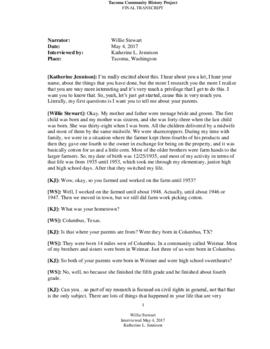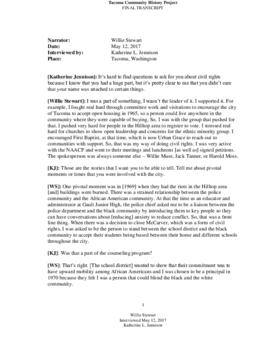Identity elements
Reference code
Name and location of repository
Level of description
File
Title
When Races Collide: Willie Steward and the Voluntary Desegregation of Tacoma Public Schools
Date(s)
- 2017 (Creation)
Extent
Content and structure elements
Scope and content
Oral history interview with Willie Stewart by Katherine L. Jennison conducted 05/04/2017, 05/12/2017. On the heels of the Brown v. Board of Education decision and the Civil Rights Act of 1964, the Tacoma School District took voluntary measures to desegregate a select number of schools with high non-white enrollment. The district superintendent, Dr. Angelo Giaudrone, drew attention to the de facto segregation, and primarily focused on two elementary schools: Stanley Elementary, with a black population of 64 percent and McCarver Elementary, with a black population of 84 percent. In 1963, a subcommittee was formed to analyze and study the de facto segregation and provide recommendations for potential solutions. On July 8, 1966, a plan was announced by the school board for an optional enrollment program that relied on closing McCarver Junior High and to provide limited open enrollment to students affected by the closing. The district hired its first black principal, Willie Stewart, in 1970 in order to bridge the divide between the school district and the black community. Stewart led the summer counseling program to work with families on the transition between the closing of their neighborhood school and their new school of their choice. According to the United States Commission on Civil Rights a decade later, the summer counseling program was pivotal to the success of the voluntary desegregation program in the Tacoma School District.
System of arrangement
Conditions of access and use elements
Conditions governing access
Technical access
Conditions governing reproduction
Individuals may use project materials for scholarly or research purposes, according to the provisions of fair use, but reproducing, publishing, or broadcasting any oral history project materials requires permission. No use beyond limited quotation for educational and research purposes should be made of these interviews and other materials without obtaining written permission. For more information, contact the University of Washington Tacoma Library.
Languages of the material
Scripts of the material
Language and script notes
Finding aids
Acquisition and appraisal elements
Custodial history
Immediate source of acquisition
Appraisal, destruction and scheduling information
Accruals
Existence and location of originals
This oral history is a part of the University of Washington Tacoma Community History Project. To access additional content related to this interview, see the UWT Digital Collections.


